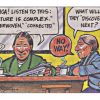KJIPUKTUK (Halifax) – Despite the icy roads and snowy conditions, attendance was high on Tuesday for a panel about environmental racism at the Halifax Central Library.
The event was organized by the Dalhousie Aboriginal Law Students Society, the Dalhousie Black Law Students Society and the Dalhousie Environmental Law Students Society.
The speakers at the event were Rosalie Francis (via Skype), a member of the Mi’kmaq First Nation and lawyer specializing in Aboriginal Law; Sara Seck, an environmental law professor at Dalhousie’s Schulich School of Law; and activist Raymond Sheppard, a member of the African Nova Scotian community of Lincolnville.
The weakest link, they thought, is the African Nova Scotian and Mi’kmaq communities
Sheppard experienced environmental racism firsthand, as a first-generation landfill sat within one kilometre from Lincolnville since it was opened in 1974.

However, Sheppard was there to speak on the environmental racism affecting the community of South Shelburne, an African Nova Scotian neighbourhood that is also home to the town dump. Louise Delisle, the Shelburne activist originally scheduled to speak could not make it because of the weather.
“The residents of this African Nova Scotian community have grown so sick from this pollution that emanated from the town dump… (it) was causing many difficulties and rare cancers in the community at a higher rate than they had ever been seen in the community prior to,” said Sheppard.
The dump was closed in the early 1990s, and then was used as a waste transfer station until Dec. 2016. But that wasn’t the end of it.
“The dreadful unhealthy conditions that were forced upon the community are still making people sick because of the exposure to the smoke and smell, and possibly the well water may also be contaminated,” Sheppard said.
Sheppard believes that Shelburne, like many African Nova Scotian communities, was targeted because it could not mount “adequate defences.
“The weakest link, they thought, is the African Nova Scotian and Mi’kmaq communities, so therefore we will locate anything and everything we’ve got to get rid of in and around those communities,” said Sheppard. ”We know they have no large incomes. We know their levels of education is lower. So let’s locate this dump over here…we don’t care.”
No consultation and no response
Law professor Sara Seck pointed out that environmental racism is “very widespread around the world,” and her presentation focused on Canada’s commitment to international human rights law.
Seck mentioned that the United Nations Human Rights Council has a Special Rapporteur, dedicated to investigating various issues — including environmental racism — in countries around the world, aiming to protect human rights. The rapporteur visits a country, assesses their situation and publishes a report with recommendations and best practices.
Seck stressed that referencing these reports by the Special Rapporteurs would provide solid and convincing arguments when it comes to lobbying for change.
“Again, this doesn’t solve the problem but it’s a good talking point with government if you’ve got a UN report that says, ‘environmental racism is equally a concern.”
Seck referenced the Report of the Working Group of Experts on People of African Descent for Canada, which was published in 2017.
“It is a fabulous report. People should read this,” she said.
“Landfills, waste dumps, polluting industries and other environmentally hazardous activities are disproportionately situated near neighbourgoods where many people of African descent live, creating serious health risks for them,” Seck said, quoting the report. “There has been no consultation with African Canadian communities and no response has been provided to their concerns of environmental hazards.”
The report also mentions that there is an “absence of policy and legislation to address the longstanding environmental concerns in these communities.”
So while these reports do not directly solve any of these issues, they do provide solid footing for people to provide arguments in favour of protecting environmental and human rights.
They don’t have a voice and their perspectives are not considered
Speaker Rosalie Francis spoke about how environmental racism comes about when groups of people like African Nova Scotians and First Nations communities are excluded from the legal process.
“They don’t have a voice and their perspectives are not considered,” she says, adding that their communities too are targets for environmental injustices.
Francis then referenced the pollution of Boat Harbour at the Pictou Landing First Nation for a local example, and mentioned the injustices experienced by other communities outside of the province, such as the Aamjiwnaang First Nation in Sarnia, Ontario, who live next door to more than 60 oil refineries and chemical plants, making air quality the worst in all of Canada, according to a 2011 study by the World Health Organization.
For Francis, since the government seems to continue to ignore these mounting injustices, the onus is on grassroots movements in combination with activist efforts to first continue to spread awareness about these issues, and then to band together and lobby for change in policy and practice.
See also: African Nova Scotian coalition doesn’t want UN report collecting dust on a shelf
If you can, please support the Nova Scotia Advocate so that it can continue to cover issues such as poverty, racism, exclusion, workers’ rights and the environment in Nova Scotia. A pay wall is not an option since it would exclude many readers who don’t have any disposable income at all. We rely entirely on one-time donations and a tiny but mighty group of kindhearted monthly sustainers.



